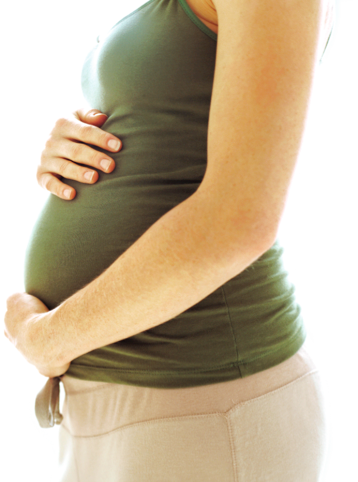Fighting pregorexia

Maggie Baumann now willingly admits to the harrowing inner conflict […]
Maggie Baumann now willingly admits to the harrowing inner conflict she endured as an anorexic mom-to-be. But back when she was carrying her second child, she was a much different woman, a woman wracked with shame about her private hell of extreme dieting and obsessive exercise.
A fitness instructor, Maggie prided herself on her small physique. She had to be fit, she had to keep her weight down, and she refused to buy maternity clothes. She wanted to be a mother and never intended to cause harm to her baby, but she was in denial about what her actions were doing to the child growing within her.

Even with her difficulties, Maggie delivered an apparently healthy, though underweight, baby girl. Her wake-up call didn’t come until four months later, when her daughter developed seizures which the doctors attributed to poor nutrition in the womb. The shame of what Maggie had done during her pregnancy only added to her feelings of inadequacy and pushed her disease to new heights. After reaching a near-skeletal state and landing in the ER with heart problems relating to her anorexia, Maggie finally entered a treatment center and found the help she needed for recovery. When therapy unearthed the real reasons behind her actions —trauma related to events from her past—Maggie was at last able to deal with her demons and begin to heal from the sickness that had threatened her life and the gestational health of her child.
What is pregorexia?
It’s important to note that women burdened by anorexia or bulimia are seldom compelled by vanity, and they typically do not set out to harm their bodies or babies. Rather, they’re often driven by a compulsive need for control, whether to strive for a mentally ingrained “ideal” or to subconsciously evade feelings about past trauma. “Pregorexic” women—like all women suffering from eating disorders—can become obsessive about counting calories, over-exercising and avoiding weight gain. For these women, the thought of gaining 25 to 35 pounds (or more, if mom starts out underweight) can seem unbearable, even though it’s necessary in order to maintain a healthy pregnancy.
Ovidio Bermudez, MD, of the Eating Recovery Center in Denver and past president of the National Eating Disorders Association, says, “A good number of women who are struggling with an eating disorder and find out they’re pregnant will put the baby first. On the other hand, there are women for whom pregnancy really poses a significant hurdle. The prospect of weight gain and the distortions on their body that pregnancy presents can exacerbate the symptoms of the eating disorder … These women will suppress weight gain at the expense of the baby.”
What are the risks?
While eating disorders characteristically begin as a mental problem, the resulting behaviors—starvation, binging and purging, over-exercising—can severely affect mom and baby. When a mom-to-be fails to consume the nutrients necessary for her baby’s development, the fetus will, in effect, “steal” nutrients from the mother’s body in order to support its own growth and development. When these resources are depleted, both mom and baby are left vulnerable to malnutrition. For the mom, this can mean exhaustion, dehydration, bone loss, increased risk of miscarriage, heart problems, and difficulties with labor, nursing and postpartum depression. The underfed baby may be at risk for poor development, premature birth, low birth weight for age, respiratory distress or other perinatal complications, as well as feeding troubles after birth.
How to get help
If you are pregnant and struggling with an eating disorder, or have a history of disordered eating, the very best thing you can do to help yourself and your baby is to be honest with your healthcare provider. Together you can decide what actions or treatment may benefit you most. If you have an active eating disorder, building a professional support team—medical, psychological and nutritional staff with expertise in eating disorders—will help your baby’s chances. Focus on becoming a whole, healthy mother for your baby; don’t get caught up with the number on the scale. (In fact, you can ask your doctor not to share your weight with you if watching the number climb makes you feel anxious or fearful.) Rely on your support team for help through pregnancy and during the postpartum period (or longer if needed) so you can get well and stay well, and confidently provide a stable environment for your little one.
If you believe someone you know may be suffering from an eating disorder while pregnant, approach her with care. Bermudez warns, “Don’t be judgmental or pushy or imposing with your views. Do show your concern and be open to dialogue.” If your friend seems to have lost perspective and her health or pregnancy is suffering, encourage her to seek professional help as soon as possible.
Success story
Maggie Baumann went on to raise two healthy, beautiful daughters and now works as a therapist in Newport Beach, California, where she has drawn from her own experiences to help other pregnant women struggling with eating disorders.







